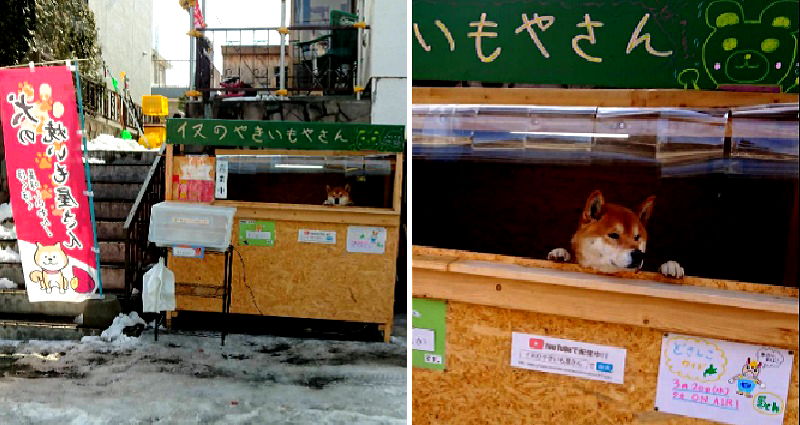In the gentle pinch of a typical morning in Shimabara City, Nagasaki Prefecture, an unremarkable house stood by a narrow lane, the kind of place that balances between domestic calm and the restless whisper of the sea beyond. Smoke-blue clouds drifted low over the hills behind Mt. Unzen. And inside the house, a man stepped out for what he thought would be just a few minutes.

What he did not count on was the message waiting just outside: a loyal four-legged friend, in motion.
A video, circulated quietly at first and then widely, captured this dog, jaw set and ears forward, running, barking, seeking help while his owner was away for only a short time. The dog’s full body spoke urgency: there was no whim in his gait, only a single purpose. Window curtains fluttered as he dashed by. Small stones beneath his paws clinked.
As viewers later pressed pause and rewind, what struck them was not simply the spectacle of a dog running. It was the heart within the motion: the thought, embedded deep inside the canine mind, that someone is in danger, I must act, I will find help. Even if he did not fully know what the danger was.
People cried at the video. Not because of grand heroics, but because loyalty, a quiet, deep current, had shown its face. In a world where many actions are measured, this action was beyond measure. The dog did not wait for permission. He did not hesitate. He acted.
His owner returned to find the dog poised at the gate, panting, tail low but steady. The reason? A brief fainting spell. The owner was safe. But that detail matters less than what happened before the saving. What matters is the instinct.
In the landscape of Shimabara, a city shaped by volcanoes and sea, by both eruption and calm, the dog’s dash was a moment of stillness in disguise. It reminded many of what we seldom expect: that sometimes the greatest rescue is not a dramatic arrival of lights and sirens, but the silent decision of a companion to stand guard.
In the aftermath, people spoke of “a true reminder of the bond between humans and their dogs.” And indeed, the bond wasn’t in the words. It was in the feet moving, the path traced, the bark piercing the stillness to call for help.
Part II: Harami-chan, the Shiba Inu “store manager” of Awaji Yume Hormone


Now shift your attention from Nagasaki’s rescued moment to the west coast of the Japanese archipelago, to the gentle blue of sea that washes the shores of Awaji Island in Hyōgo Prefecture. Here, at a yakiniku restaurant with a view of the water, there works a little dog whose job is at once whimsical and deeply grounded.
Harami-chan is a Shiba Inu, born on January 1, 2019. Her name, “Harami,” meaning the skirt-cut of grilled meat in yakiniku tradition, was chosen with a mischievous grin. A dog whose name is a meat-cut: perfect for a place where meat is the medium of connection.
When Harami-chan arrived, she was a little nervous. Guests entering the restaurant would see a tail wagging shyly, a head cocked inquisitively, a body still learning its welcome. Over time, she grew into her role: a mascot, a “store manager” in spirit, greeting patrons, offering smiles (so to speak), reminding the world that hospitality can be found in the most unexpected forms. Her wag became a trademark. Her presence an embodiment of the restaurant’s warmth.
What fascinates is how she, a dog, inhabits the space between service and sincerity. Patrons come not only for grilled meat but for the moment when Harami-chan ambles up. The clink of tongs and the sizzle of meat are accompanied by a gentle gaze, a tilt of the head. She doesn’t bark loudly. She simply is there, as if to say: “Welcome. You’re among friends, including me.”
In her role, Harami-chan reminds us of something larger: that even in a commercial place, a restaurant, the living presence of care matters. That food is not only fuel, but invitation; and that in her wagging tail is the same kind of devotion we might see in the dog in Shimabara, though expressed more quietly.
Part III: Common threads beneath different roads
Let us now draw together these two stories, as different as they are in place, tone, and time, and reflect on the deeper rhythms they share.
Instinct meets purpose
The loyal dog in Shimabara did not wait for reward. He did not seek applause. He simply acted. The drive was deeper than obedience; it was presence. Harami-chan likewise does not perform for show. Her welcoming is natural, rooted in presence. Both bodies of fur remind us that animals live in the dimension of now. The rescue dash and the greeting wag come from that still point between awareness and action.
Hospitality as protection
When we think of hospitality, we think of meals, comfort, welcome. When we think of protection, we think of danger, rescue, alarm. Yet both stories blur that boundary. The Shimabara dog bottled danger and then delivered action. Harami-chan opens a space of hospitality in the everyday. Both show us that relation, whether protection or welcome, flows from the same source: attentive being.
The human-animal bond
In both cases, the bond is not sentimental fluff. It is textured. The Shimabara video moved people because they saw something real in the dog’s minutes, real responsibility, real urgency. Harami-chan delights people because she shows itself: a dog alongside humans in the messy beauty of everyday life. We are reminded that the bridge between humans and dogs is built on shared space, mutual presence, sometimes quiet service, sometimes dramatic instinct.
Small moments, large meaning
Neither story features epic heroism in the cinematic sense. The shimmer is in smallness. The dog in Shimabara ran for a few minutes but left a long echo. Harami-chan swings her tail at countless guests but in each case whispers welcome. These are not the stories of world-changing deeds, but of world-holding gestures. In them, we find roots for how to live: with attentiveness, with presence, with care.



Part IV: What the earth teaches us through dogs
I want to dwell for a moment on what these stories teach, beyond the obvious. Because it is not only about dogs. It is about how we live, and how we might remember to be.
When I watched the footage of the dog in Shimabara, I felt something in my chest loosen. Because it was not about drama, it was about fidelity. The dog saw a gap in the day. He filled it. He ran. There is a kind of holiness in that. Not the kind shaped by temples or sermons, but the kind that emerges when someone (or some dog) notices “something is off,” and steps in.
And Harami-chan—she doesn’t have to save the day. She only needs to greet. But greeting is no small thing. In a world of hurry and fragmentation, she offers a moment: you are here, you are seen. That is a sacrament of everyday.
Together, they teach:
That presence is more radical than we suspect.
That the bond between humans and animals is a mirror: they trust us; we owe them care.
That kindness is given in action, not only intention.
That the small things, the tail wag, the gentle bark, the glance of alertness, are not trivial. They are gateways.
Part V: A quiet hope forward
I imagine the residents of Shimabara, the dog’s owner looking back at him with gratitude, the video circulating, people pausing in their lives to absorb it. I imagine the diners at Awaji Yume Hormone arriving, warm grill ahead, Harami-chan at the welcome, the sea air around them.
And I wonder: what if we took our cues from them? What if we became alert in the quiet moments and welcoming even in the small ones?
The world asks a lot of us: rescue, change, transformation. But maybe the more honest ask is gentler: pay attention. Respond when it matters. Welcome when you can. Stand guard, attuned. Say hello. Hold space.
In the rustle of leaves, in the wag of a dog’s tail, in the flicker of concern, there is the kind of truth that opens us.
And so I end with this: may you be seen. May you be greeted. May someone (or some dog) know you are here, and respond. Because in that moment, the world becomes just a little kinder, and our hearts a little more open.

